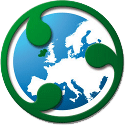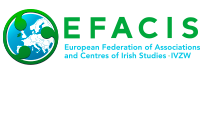In the EFACIS Kaleidoscope Series we ask writers and artists about matters that are close to their heart. This was absolutely the case with Kaleidoscope 1, where we collected fiction authors’ observations about the act of writing fiction. This resulted in the website https://kaleidoscope.efacis.eu/ where we published authentic insights in often poetic form by 50 authors, made fully available to the community of Irish scholars.
As the European Federation of Associations and Centres of Irish Studies, EFACIS is very interested in the European element of Ireland, we decided to make this the focus of Kaleidoscope 2. Especially in post-Brexit Europe, with the US in a surreal situation and China no alternative, we wanted to know how Irish writers saw Europe and European values.
In this second instalment we not only invite fiction writers but authors from all possible genres. It was no easy task to find a balance between the three genres as well as within each genre, and we wanted to have representatives of Ireland, North and South, as well as Irish writers in the diaspora. Anne Fogarty (UCD) and Hedwig Schwall (KU Leuven) are the driving forces and editors of the project. We ask for two contributions: first, a creative essay or story about what Europe means to you; second, your answers to a questionnaire.
For the story/essay which would sum up the author’s attitude to Europe we started off with rather general questions: how did Europe touch upon your life and work? How did you benefit from Europe/the EU? How has Ireland changed since 1973? How do you feel about EU policies now? As the texts are coming in they are starting to form an increasingly complex and varied picture of Europe, though one which seems to suggest that it is the everyday culture of Italy, France and Spain which appeals most to Irish writers.
As EFACIS caters for a wide community of scholars and their students we also invite the participants to answer a questionnaire which adds to the picture they gave in their essay and focusses more on perceptions and images of the European Union within which the texts are politically located. In twenty questions the writers are asked to look at concrete aspects of the interaction between Ireland and the EU. For this part of the project we were joined by Joachim Fischer, our colleague from the University of Limerick. Holding the Jean Monnet Chair in European Cultural Studies (2019-2022) he hopes the responses will help to stimulate the debate about Ireland’s place in Europe, Ireland’s membership of the European Union as well as the past, present, and future of the EU, in particular in the different sectors of the Irish educational system. They will form a valuable Irish contribution to the ongoing EU-wide Future of Europe Debates. There can be little doubt that Ireland’s integration in the EU will be considerably accelerated by both Brexit and the covid-19 crisis. Irish writers may be particularly well placed to comment on the curious situation where English is the effective lingua franca of the EU but its native speakers only represent 1.5% of the EU population. Writers in Irish may yet have an entirely different take on this situation and on languages as carriers of culture.
This website will be divided in two parts. First there are the contributions by the different authors, second, we present the answers to the following questions we put to the participants.
Interview Questions: The European Union and its citizens, writers and artists
In many EU member states, people vaguely know that the European Union is a good thing. This certainly appears to be the case in Ireland, where according to the latest Eurobarometer survey of Autumn 2019 (no. 92) 63% of the population state that the EU evokes positive feelings (the highest percentage of all member states) and only 7% are negatively disposed towards it. In order to make this picture more precise we invite f writers to illustrate more concretely how the EU is perceived in Ireland or how it has changed Ireland (North and South).
Beside our interest in the European dimension of your work, we also want to explore your attitudes towards the European Union and questions of citizenship (national, European, global, or otherwise). We think the project is rather timely, as both Brexit and covid-19 are likely to link Ireland (the Republic of Ireland at least) ever closer to the European continent generally and the EU more specifically. The next few years will also be a time when European solidarity will be very strongly tested. It is an opportune time to capture Irish attitudes towards these developments and the multi-cultural and multi-lingual political structure that is the EU which Ireland joined nearly half a century ago.
Some of the ca. 20 questions may simply not apply to you or not interest you at all, so feel free to ignore them.
With sincere thanks,
Anne, Joachim and Hedwig
European culture & you
1. Which European authors & artists have impressed you most?
2. How is your work received on the European continent? Is its reception different from that in Ireland?
3. When abroad, which aspect of (your) Irishness do people pick up on/project on you? When you explained ‘Ireland’ to them, what surprised people most?
4. If you were a writer in residence somewhere in Europe, what would you ideally expect of that?
5. Is Ireland becoming more “European”? Is the European cultural influence in Ireland rising or falling in Ireland, esp. vis-à-vis US-American influence?
Will European media matter more in the Ireland of the future vis-à-vis non-EU UK media?
The EU’s visibility
1. What do children in your circles know about the EU? Is the EU discussed in the curriculum, or informally, at school?
2. What do your parents (previous generation) think/know about the EU (its effects in Ireland)?
3. Should the EU be closer to its citizens, and if so, how c/should that happen?
4. If you were to receive funding from some EU source to present it (critically), how would you go about it?
5. How would you normally hear about the EU? Via which news channels, digital media, people? Or not at all?
6. What do you think about the way the EU itself (e.g. via its representations in Dublin or MEPs) is presenting itself in Ireland?
The EU and Ireland
1. In which ways has Ireland changed since it joined the EU in 1973?
Or what, to you, is the most striking effect of the EU on Ireland ?
2. And the inverse: how would you describe the unique qualities Ireland brings to the EU?
3. What role do languages play in how Irish citizens relate to the EU?
3a. Post-Brexit only 1.5% of the EU’s population will be native speakers of English. Does the multi-linguality of the EU influence how you relate to it as a whole?
3b. Do you think it would be helpful for the education system in the whole island to have more foreign languages on the curriculum?
4. What is your view about the EU’s policies regarding Refugees? Climate Change? Austerity? Government deficits? Defence policy? Or any other aspect you’d like to comment on.
5. Has the EU (its laws, or news reports from Europe) helped to promote gender balance in Ireland? Is gender equality more present in the arts than in life in general? Is there more equality in businesses than in the arts or the other way round? As far as you can judge does this differ from the situation in other EU member states?
6. Will covid-19 fundamentally alter our lives in Europe and beyond? If so, what radical new chances/structures would/should it offer?
7. What do you think will be the consequences of Brexit for Ireland, politically, economically, culturally? And its impact on Irish-British, Irish-Scottish relations?
8. Post-covid, Ireland, like other member states, is likely to become very dependent on EU and ECB funds. Is this a good or a bad thing?
9. What does the future hold for the EU? Can you imagine a European Union where nation states matter less and the EU becomes the primary political structure EU citizens relate to?
 Efacis
Efacis 


